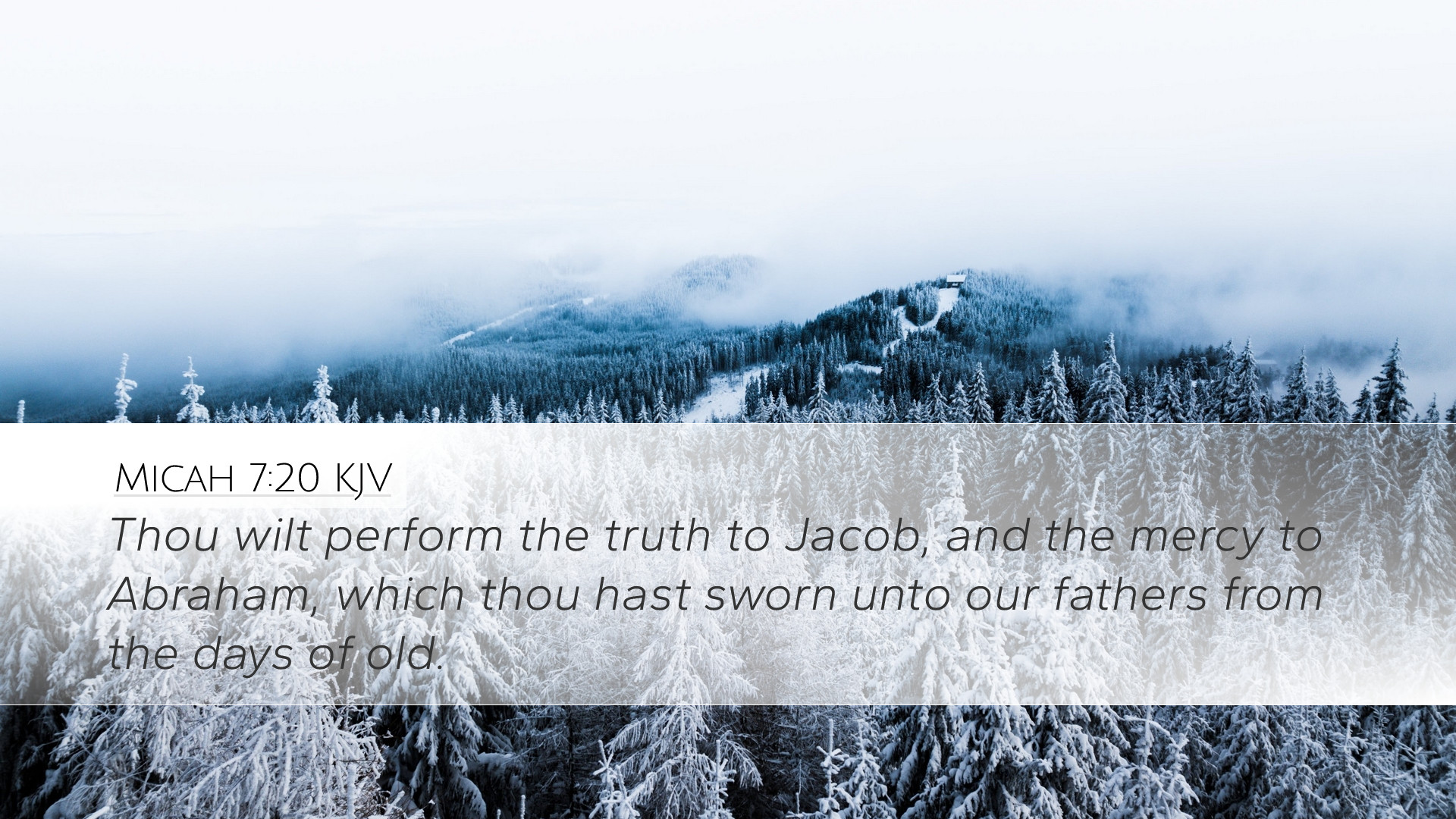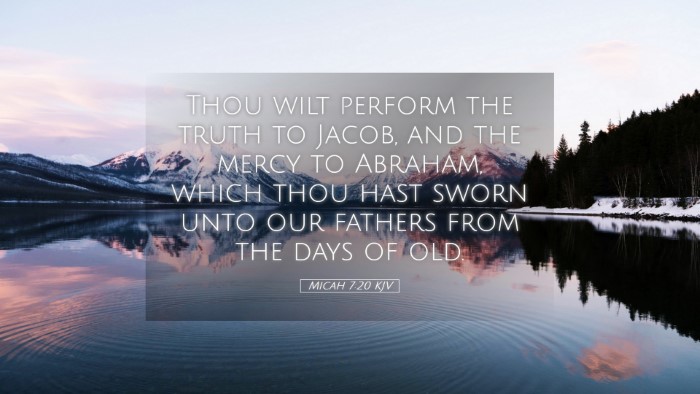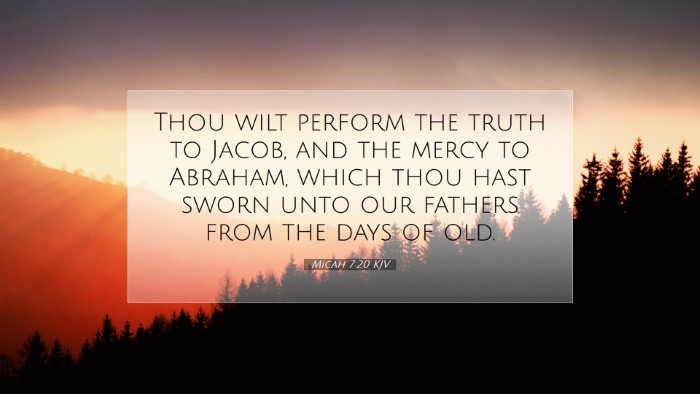Old Testament
Genesis Exodus Leviticus Numbers Deuteronomy Joshua Judges Ruth 1 Samuel 2 Samuel 1 Kings 2 Kings 1 Chronicles 2 Chronicles Ezra Nehemiah Esther Job Psalms Proverbs Ecclesiastes Song of Solomon Isaiah Jeremiah Lamentations Ezekiel Daniel Hosea Joel Amos Obadiah Jonah Micah Nahum Habakkuk Zephaniah Haggai Zechariah MalachiMicah 7:20
Micah 7:20 KJV
Thou wilt perform the truth to Jacob, and the mercy to Abraham, which thou hast sworn unto our fathers from the days of old.
Micah 7:20 Bible Commentary
Commentary on Micah 7:20
Micah 7:20 states: "You will cast all our sins into the depths of the sea." This profound declaration encapsulates a foundational truth in the character of God, emphasizing His mercy, forgiveness, and the promise of restoration. In this commentary, we will explore various insights derived from public domain commentaries, focusing on the significance of this verse for pastors, students, theologians, and Bible scholars.
Overview of Micah 7:20
This verse concludes the prophetic book of Micah, which frequently addresses themes of judgment and restoration. The closing verses shift towards a tone of hope and assurance, underlining the compassionate nature of God towards His people. In this context, Micah proclaims God’s intent to forgive and to remove the transgressions of Israel, symbolically represented by the casting of sins into the depths of the sea.
The Theological Significance of Forgiveness
Both Matthew Henry and Adam Clarke highlight that this verse provides a comprehensive view of divine forgiveness. This divine act is not merely the removal of guilt but also signifies the complete obliteration of sin from God's remembrance.
Matthew Henry's Insights
- Comprehensive Forgiveness: Henry emphasizes that God’s forgiveness is total, suggesting that when sins are cast into the sea, they are utterly removed from God's sight, as He chooses not to remember them.
- The Depths of the Sea: The imagery of the sea conveys both the vastness and depth of the ocean, symbolizing the unfathomable extent of God’s mercy.
Albert Barnes' Perspectives
- Hope for Restoration: Barnes connects this verse with the broader theme of hope found in the Minor Prophets, urging believers to grasp the hope of divine forgiveness and renewal.
- God’s Faithfulness: According to Barnes, this promise reflects God’s covenant loyalty, ensuring that despite Israel's unfaithfulness, divine mercy endures.
Adam Clarke's Contributions
- Symbolism of the Sea: Clarke elaborates on the symbolism of the sea, describing it as a representation of chaos and destruction, yet paradoxically, it serves as a vehicle for divine mercy through the casting away of sin.
- Restorative Justice: He underscores the aspect of restorative justice in God’s dealings with humanity, portraying the act of casting away sin not merely as punishment but as a means of restoration.
The Context of Micah’s Prophecy
The context of Micah's prophecy is crucial for understanding the depth of 7:20. The preceding verses in Micah depict a society steeped in corruption, injustice, and rebellion against God. Micah, as a prophet, vocalizes not only the judgment but also the deep yearning for restoration. The promise of forgiveness encapsulated in Micah 7:20 speaks to a remnant seeking reconciliation with God.
The Role of Confession and Repentance
This verse also implicitly highlights the necessity of confession and repentance as prerequisites for forgiveness. The prophets often called for a genuine return to God, underscoring the relational aspect of being restored to divine favor. The act of casting sins into the ocean signifies God’s willingness to cleanse and redirect His people towards righteousness.
Application for Today’s Believers
Micah 7:20 serves as a powerful reminder for contemporary believers regarding the nature of God’s forgiveness. The insights from the commentaries emphasize the following:
- Assurance of Forgiveness: Believers can find assurance in the understanding that God completely forgives sins, reinforcing the concept that spiritual life should be marked by grace and not guilt.
- Encouragement for Outreach: The verse encourages believers to extend forgiveness to others, embodying the model of divine grace in our relationships.
- Hope amidst Struggles: For those who may feel weighed down by their sins, this verse provides hope that no sin is beyond the sovereign grace of God.
Conclusion
In conclusion, Micah 7:20 encapsulates a vital truth of the Christian faith—God's grace triumphs over sin. Drawing from the insights of Matthew Henry, Albert Barnes, and Adam Clarke, it is clear that this promise of forgiveness is profound and transformative. For pastors, students, theologians, and Bible scholars, this verse not only offers theological insight but also calls for a practical application of grace in their lives and ministries.


